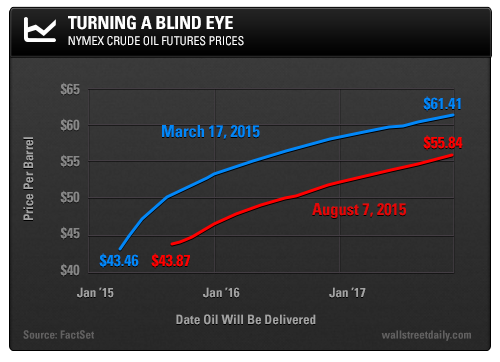Apparently Economics 101 is no longer a required course for someone to become the CEO of a major natural resources company. Rudimentary economics (and common sense) says that when the price of a commodity collapses because of oversupply, you cut back on production. This allows supply and demand to eventually rebalance, stabilizing prices.
But the big players in iron ore — Rio Tinto (LONDON:RIO), VALE SA (NYSE:VALE) and BHP Billiton (LONDON:BLT) — all raised output as iron ore prices plunged. For some reason, these companies’ strategy is to produce as much as you can, then close your eyes, cross your fingers and hope for the best. And their shareholders have paid the price for this folly.
Now, it seems the CEOs of many U.S. shale oil companies have also decided to commit seppuku — ritualistic suicide. Although, it’s the shareholders who will suffer.
Living in Fairy Tale Land
The usual suspects like Pioneer Natural Resources (NYSE:PXD), Devon Energy (NYSE:DVN), Whiting Petroleum Corporation (NYSE:WLL), and Continental Resources (NYSE:CLR) are all raising their oil production based on oil price outlooks that surely must be made up.
Oil prices are down 55% from just a year ago and 20% in July alone, but some producers say they’re making plans for oil’s swift return to $90 per barrel.
Devon and Whiting pulled record amounts of oil out of the ground in the latest quarter. Even if oil stays low, these companies believe they can flourish merely on cost reductions and increased efficiencies.
Some of these are the same companies that hedge fund manager David Einhorn warned about in May. In fact, his number one target, Pioneer, is planning to ramp up activity to pre-bust levels by early 2016. Pioneer’s CEO believes it can “outrun” the global oil market share war. Meanwhile, in the second quarter, the company posted a net loss of $216 million.
These same companies’ stocks have also outpaced the fall in the price of WTI crude. Since mid-April, WTI has dropped about 20%. In that same period, Pioneer’s stock is down 30% and Continental’s stock is down nearly 40%.
Back in the Real Oil World
Most analysts are now saying at least 500,000 barrels per day of U.S. production has to be cut. Many of the major oil service and giant oil companies’ outlooks reflect this belief. Both parties realize that “oil prices will be lower for longer” than originally anticipated as BP (LONDON:BP) CEO Bob Dudley said.
Makes sense to me.
Oil inventories are near record levels all over the globe. And OPEC is producing more than ever and soon Iran will add more production on top of that. OPEC’s output spurt is being led by Saudi Arabia, which produced a record 10.6 million barrels in June.
This increased oil output led the International Energy Agency to say that global oil supply is growing at “breakneck speed.”
Both the majors and the oil service companies have slashed tens of thousands of jobs because of the outlook for a prolonged downturn in the oil patch. The oil majors have literally slashed $200 billion worth of projects by either deferring or canceling them.
Futures Market Gloomy
Their outlooks are backed up by the activity in the futures market — oil contracts have taken their worst hit in years. Contracts for oil to be delivered in 2016 and 2017 are below their March lows. Even contracts in the 2022 to 2023 time frame are selling in the $63 range.

No doubt this gloominess in the futures market is being influenced by U.S. shale oil producers’ stubborn refusal to cut their output. You see, prices are so low on long-dated oil contracts that it makes little sense to hedge their production. That means the companies mentioned above will be fully exposed to lower prices, which the lot had been largely shielded up until now by existing hedges.
If futures prices turn out to be correct, it’s bad news for the top 10 U.S. independent oil producers. The investment bank Tudor, Pickering, Holt & Co. told The Wall Street Journal that these producers will outspend their cash flow by $11.4 billion in 2016.
As I’ve asked before, the question then becomes, how long will the banks and Wall Street keep funding these companies? Especially with the companies so intent on harming themselves.
Just look at the difference a year makes: In Q2 of 2014, 10 of the largest U.S. shale companies reported profits of nearly $3.5 billion. In Q2 of 2015, these same firms reported losses of almost $15 billion.
David Einhorn was right on Lehman Brothers, and he may turn out to be right again.
